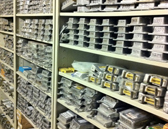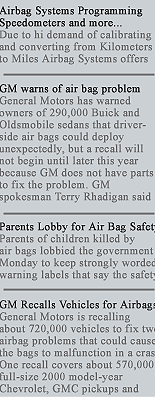


Diagnostic
Software for trouble code retrieval with out the use of a scan tool device.
Full On-line support complete with trouble code definitions and wiring
schematics.




By CATHERINE STRONG
Associated Press Writer WASHINGTON (AP)
Parents of children killed by air bags lobbied the government Monday to keep strongly worded warning labels that say the safety devices can kill young children riding in the front seat.
Parents for Safer Air Bags also encouraged the National Highway Traffic Safety Administration to adopt more rigorous crash tests to certify air bags. The group believes that would force automakers to put safer air bags in new cars.
Air bags have been blamed for at least 146 deaths, mainly young, unbelted children and some shorter women whose necks were broken by the force of the bags in low-speed crashes they should have survived, according to NHTSA data.
Safety regulators are working on new rules for air bags that specify which crash tests must be used for federal certification. The regulations, expected to be announced March 1, are intended to prevent air bag deaths in new cars.
About 25 relatives of children and some adults killed or seriously injured by air bags met with acting NHTSA administrator Rosalyn Millman and other transportation officials to express their views about the proposed safety rules.
``The agency is proposing to water down the air bag warning label. We think that is premature,'' said Robert Sanders, a Washington-area lawyer who founded the group after his 7-year-old daughter was killed when the passenger-side air bag deployed in a low-speed crash in 1995.
Labels now required warn parents that ``death or serious injury can occur'' from the air bag and that children are safer in the back seat. They are red, yellow and black and are on the car visor and dash.
NHTSA officials are considering language that does not include the word ``warning'' or say ``death can occur'' to children riding in front.
Sanders and some of the other parents said the labels should not change until there is proof that new air bags have eliminated the threat to children and small adults.
New technology being developed by automakers includes sensors that determine when to suppress an air bag rather than inflate it and so-called dual-stage air bags that inflate with less force in lower-speed crashes.